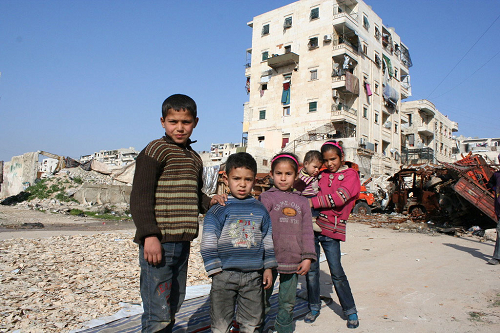UN officials alarmed by closure of access route in eastern Aleppo; call for ‘humanitarian truce’
The United Nations humanitarian chief on 21 July expressed grave alarm over developments in the eastern part of Aleppo city in Syria, where civilian, humanitarian and commercial movements have been effectively cut off following the closure of the last remaining access route in and out of the area.

Destruction in Salah Ed Din Neighborhood.
“Our highest priority is to re-establish access to eastern Aleppo city, through both cross-line convoys and cross-border operations from Turkey, so that we can replenish critical life-saving assistance like food, medical supplies and fuel, and assure the continuation of basic services,” said Stephen O’Brien, UN Under-Secretary-General for Humanitarian Affairs, in a statement released by the UN Office for the Coordination of Humanitarian Affairs (OCHA).
Noting that an estimated 200,000 to 300,000 people are at risk of besiegement, Mr. O’Brien said that humanitarians have not been able to reach eastern Aleppo since clashes started on 7 July between the Government of Syria forces and non-state armed groups, which rendered Castello Road impassable.
Hundreds of mortars, missiles and projectiles were launched on both eastern and western Aleppo in the past weeks, resulting in dozens of deaths and hundreds of injuries, including several children. Hospitals and other civilian infrastructure have also been affected by the fighting.
On 16 July, for example, a hospital in eastern Aleppo city was reportedly hit, and a number of medical staff injured. It was the third time the facility was hit in the past two months.
Mr. O’Brien – who is also the UN Emergency Relief Coordinator – reiterated that the humanitarian community has repeatedly stressed that medical staff and facilities must not be targeted, as international humanitarian law clearly states.
“I call on all parties to the conflict to immediately enable unconditional, unimpeded and sustained access to the millions of people in besieged and hard-to-reach areas across Syria,” he said, urging them to lift all sieges, respect the safety of medical and humanitarian workers, and ensure the protection of civilians and civilian infrastructure.
The Under-Secretary-General added that while the UN and its partners still have some stocks to respond to humanitarian needs, food in east Aleppo is expected to run out by the middle of next month.
In other news today, UN Senior Adviser Jan Egeland told reporters in Geneva that while July was the best month ever in terms of permissions granted by the Government of Syria for access to besieged areas, it has been far from what was hoped.
“The fighting is the main reason for why we are not going to all of these places,” he said, emphasizing the need to “regain momentum,” such as by a humanitarian truce.
“A humanitarian truce could work in the following manner: We get 72-hour notice to go and we get a pause in the fighting for 48 hours. That’s what we need, that is what it takes to have a lifeline to places where people are at the brink of starvation,” he added.
Emphasizing that the “clock is ticking,” Mr. Egeland concurred that there are only a few weeks of supplies remaining.
“The homework we have given as humanitarians to the co-chairs, which are the United States and Russia, and to other members of the ISSG [International Syria Support Group] is the following: give us 48 hours every week to be able to go to eastern Aleppo where there is a quarter of a million civilians and they have no other lifeline than this Castello Road, and that we can get in cross-border, NGOs [non-governmental organizations] and UN and cross-line, UN, Red Cross and Red Crescent,” he said.
Source: United Nations
- 304 reads
Human Rights
Ringing FOWPAL’s Peace Bell for the World:Nobel Peace Prize Laureates’ Visions and Actions

Protecting the World’s Cultural Diversity for a Sustainable Future

The Peace Bell Resonates at the 27th Eurasian Economic Summit

Declaration of World Day of the Power of Hope Endorsed by People in 158 Nations

Puppet Show I International Friendship Day 2020

